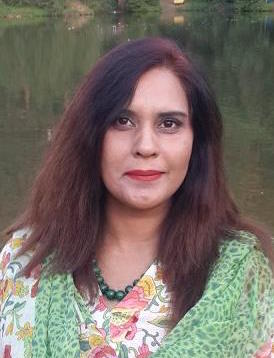 Syeda Adeela Bokhari
Syeda Adeela Bokhari
Chief Information Technology
Federal Board of Revenue
Ministry of Finance, Government of Pakistan
Public Policy Program (’07)
Please tell us about your career path so far. What is your area of specialization and how did you come to work in this area?
In Pakistan, civil servants are trained to work in diversity. I started my career in 1998 as a probationary officer at the Federal Board of Revenue (FBR). Until 2006, I worked in Regional Tax Offices across Pakistan as tax collector, initially as Assistant Commissioner and later as Deputy Commissioner Inland Revenue Service. My assignments have been diverse and it has been a rich learning experience. For instance, during my posting at District Khairpur in 2001, I worked with the District Mayor to create awareness in illiterate poor women about their rights and campaigned against honour killing. I also delivered lectures on career guidance at the Agha Khan Foundation in Karachi in 2003. And then in 2006, I had the opportunity to go to GRIPS as ADB scholar to do my Masters in Public Policy.
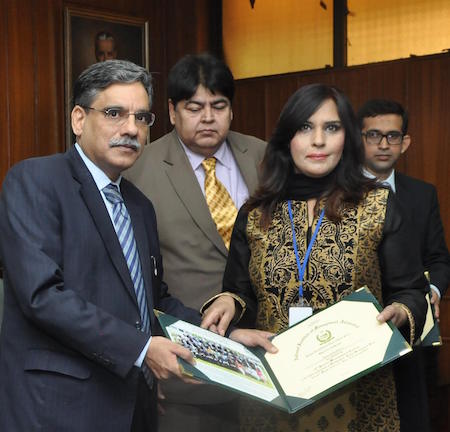
Certificate Award Ceremony at the 19th Senior Management Course, National Institute of Management, Islamabad
Upon completion of my studies at GRIPS in 2007 I joined the Regional Tax Office in Karachi. In 2008 I went to Cairo where I did voluntary work for Operation Smile, raising funds for the children with cleft lips. I also worked at Modern English School, Cairo from 2009-2011, teaching English Literature and Research Methodologies to grade 11-12 students utilising the knowledge gained at GRIPS during the Academic Writing Workshop. I became a member of Nefertiti (one of the famous international clubs for diplomats wives in Cairo) which was another opportunity for me to meet ladies and diplomats from around the world. I kept on working for humanitarian causes to raise funds for Pakistan Flood Relief Initiative PFRI and help flood-affected people in Pakistan in 2011 from Cairo. This was created on need basis with the help of my few friends in Pakistan.
I returned to Pakistan in July 2011 and re-joined FBR where I started working as Secretary Public Accounts Committee, dealing with Audit Para, i.e. any irregularities, inefficiencies, omissions found or questions arisen during the Internal or External Audit. In 2011-2012 the Public Accounts Committee settled almost all pending paras.
It was also for the first time in the history of FBR that the Regional Tax Offices got their Departmental Account Committee minutes (minutes of meetings between the Regional Tax Offices and the audit team) on the same day. This was breaking from the traditional practice as it usually took more than a year. Many of the accounts were settled, a measure to judge the efficiency of an officer conducting those meetings.
I was motivated because working hard brought me recognition, my commitment to my profession earned me repute and I learned that being sincere and dedicated to any task can really transform the usual lethargic culture being associated with bureaucracy around the world.
In March 2013 I applied for a deputation to the National Vocational and Technical Training Commission and remained there for almost 4 years, until 17 October 2016, when I returned to the FBR Headquarters to assume the position of Chief Tax Payers Audit.
From March 2013 until mid-October 2016, you worked as Director General at the National Vocational & Technical Training Commission (NVTTC). Please tell us about the Commission, its goals and mission.
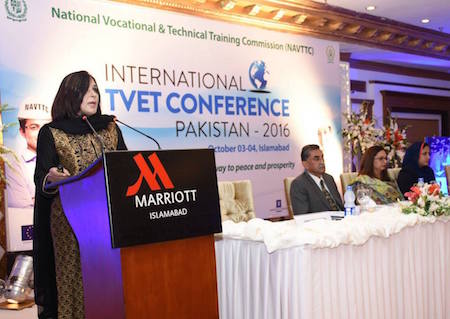
Adeela speaking at the International TVET Conference
In early 2013, I walked in an interview with the then Executive Director, Mr. Tariq Shafi Chak – who later became my mentor – at National Vocational and Technical Training Commission, Prime Minister Secretariat (Public). This organization was unique as it deals with skilling the youth of Pakistan. This, as of today, is facing many challenges in the context of Pakistan as well as the world over. With Sustainable Development Goals, the concept of education is now broad and inclusive. It is not just primary, middle, matric, inter and graduation/post-graduate education, it also includes technical knowledge and skills. As more children and adults receive and complete elementary education, it is important to teach them skills that enable them to work in dignity, supporting themselves and their families. I was entrusted with the responsibility to establish a system of accreditation. A little spadework had been done by my predecessor, yet it took quite some effort to set up a sustainable and reliable system as per the guidelines of the International Acceptable Standards of Technical Education and Trainings.
The National Vocational & Technical Training Commission has adopted integrity, quality, service and employability as its core values, reflecting its commitment to achieve its objectives that are envisioned in the National Skill Strategy and the Technical and Vocational Education and Training (TVET) Policy of Pakistan. With a view to improving the quality of technical training in the country, the Government launched the first ever TVET Policy in March 2015. Assisted by the TVET Reform Support Programme and with the Deutsche Gesellschaft für Internationale Zusammenarbeit (GIZ) as its main partner, the Government of Pakistan has started implementing the National Skills Strategy. The reforms have been a success and unique, one of its own kind. We are grateful to our development partners, Germany, Norway, the Netherlands and the European Union for offering their support to the TVET sector of Pakistan.
The primary goal is to provide our youth skills so they can become productive citizens of Pakistan rather than adhering to anti-social elements out of frustration such as following the pursuit of Al-Qaeda or ISIS or the world of crimes. NVTTC therefore provides support, direction and facilitation to its provincial partners enabling them to offer high-quality trainings and technical skills to capture the demographic dividend and provide youth with employable skills. We are to ensure that training providers offer relevant trainings with assured access for the youth, while adhering to regulations and quality standards.
In this capacity, what do you see as the main opportunities and challenges for Pakistan over the course of the next five to ten years?
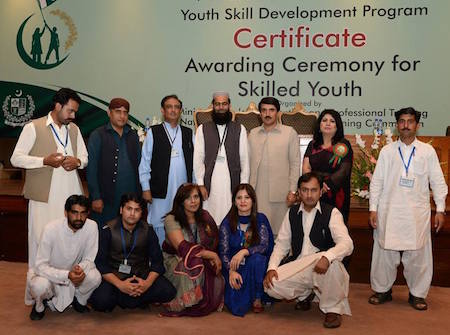
Prime Minister Youth Skill Certificate Awarding Ceremony
Pakistan foresees an approaching “youth bulge”; 10 years from now the percentage of youth might outnumber the rest of the population. Youth can be an opportunity or a threat; it depends on how Pakistan tackles the approaching youth bulge. With sound policies, the Government can ensure that all children reaching the age of 15 years are educated, trained and well-equipped to enter the labour market with decent jobs available for them.
Unemployed youth can easily get frustrated. If they are not able to earn a respectable living for their families there is a possibility that they turn into an eminent threat for the stability of this country. They are also the ones who are responsible for taking care of their dependents (that is reported to be 77 million). If Pakistan doesn’t invest in this human capital, they will be a cause of social and political unrest. Technically sound and well-educated youth therefore is one of the main economic assets for a country or a region.
I see Pakistan is on the right track. A once neglected sector is now being focused on. The Prime Minister is paying special attention to skill development and we have improved the quality of technical trainings in the last few years. The challenges are still enormous and it requires continuous support from the Government as well as development partners because this will surely change the fate of many unfortunate people.
What are some of the biggest challenges you face in your work? And what have been the most interesting or rewarding aspects of your career thus far?
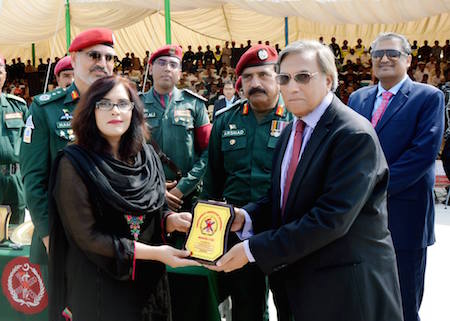
At Rescue 1122, September 8, 2016
The biggest challenge has been the frequent changing of bosses. In almost four years I had to work with some eight different bosses, all with their own views and work style. Apart from this, building team spirit among subordinates in the provinces was also difficult. Initially the provinces showed resistance to work as one team and it took me quite some time to win their trust and convince them that working together can make a real difference. We can save resources, energy and time by sharing what has already been accomplished by one with all others and by working in unity and developing consensus for policies to be implemented. It was finally developed after much of persuasion and debate but in the end we all realized that it is for our own best interest that we work together to achieve common objectives.
Although there were many challenges to overcome, it has also been rewarding. I used to plan my monthly and quarterly targets and steadily, starting from scratch, I have given NAVTTC a system of accreditation and quality assurance in technical education. It gives me immense satisfaction knowing that wherever I have worked I have made a difference.
Moreover, during my stay at NAVTTC, I was able to interact with many TVET authorities in different countries and I represented Pakistan in various international forums, like in Brussels, Seoul, Chengdu, Beijing (China), Amman (Jordan) and delivered lectures on diverse topics which was also really rewarding.
In October 2016 you were transferred back to your parent organization, the Federal Board of Revenue HQ in Islamabad, to briefly serve as Chief Tax Payers Audit and since December as Chief Information Technology. What are your main responsibilities and duties?
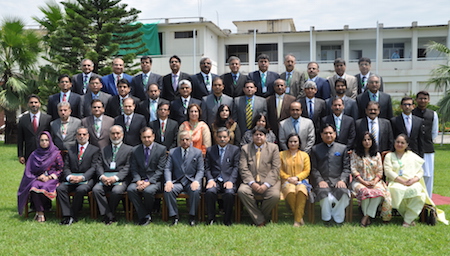
Participants in the 19th Senior Management Course, National Institue of Islamabad, Pakistan
In past few weeks we conducted workshops for field audit techniques in Islamabad, Lahore and Karachi major cities to field officers of grade 18.
I have helped developing a new taxpayers’ Audit Policy for Pakistan. The ‘Audit Policy 2016’, has proposed a paradigm shift from the past. Previously FBR used to randomly select the cases for Audit. This time we have laid down certain parameters for the selection of a case. This is to reward the compliant tax payer and only audit cases where some default has been detected. So we say it is shift from random to parametric and from general to specific (risk based approach) where there is wilful default or misinterpretation of law. This new trend in taxpayers’ audit will not only promote compliance with the existing tax laws but will also generate increased revenues for better public spending by the Government of Pakistan. This can be assured through equivalent tax policies where a taxpayer knows that good citizens are appreciated and defaulters are being punished. The draft has been approved by the Board and will be launched soon.
On 5 December 2016, I was offered an even more challenging position that of Chief Information Technology at FBR which is a high profile assignment and demands more commitment. I have accepted the offer and during the next few years I will be working on revamping the old system and will hopefully be successful in establishing an integrated solution for all IT related issues.
What led you to GRIPS? What was the most important thing you learned while here, and how has your experience at GRIPS prepared you for future endeavours?
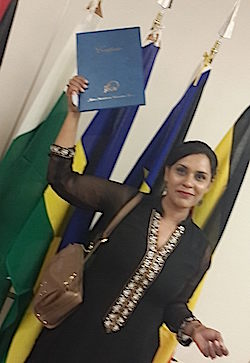
Proudly Showing her Certificate from the JICA Course in Yokohama
I was lucky to get an ADB Scholarship to study at GRIPS in 2006. GRIPS for me has been a life-changing experience. I got an opportunity to learn from some of the best teachers and to polish my skills. Before enrolling I had no clue how to prepare policy documents but GRIPS taught me how to learn, do and implement many things that I am doing today. I interacted with some 40+ nationalities at GRIPS from all around the world. I discovered my potential, what I am really capable of. I made unforgettable friends; I learned the meanings of love, respect and hard work. In a way GRIPS has transformed me completely. Today I know that authority has to be exercised with responsibility. I learned honesty, discipline, hard work and service from my Japanese colleagues. Tokyo inspired me by showing me the world that was beyond my imagination, where people were respected for who they are. My Academic Writing Skills sessions taught me intellectual discipline and the value of copyrights and intellectual property and I learned how to conduct research and write policy papers.
Building on the knowledge and skills obtained at GRIPS, I have authored the TVET Vision 2025 for Pakistan and compiled the first TVET Country Report for Pakistan which is available on UNEVOC website. I have worked on some 8 policy papers, all of them have been notified within 3 years and many among them are under implementation. We have developed national and international recognition for our accredited programmes. It is indeed an honor for me to be a part of the GRIPS Alumni and will always remember my experiences at the Institute and the friends I made there. Thank you GRIPS for contributing towards my personal growth. It has always been nostalgic to write about GRIPS even though 10 years have passed now, it remains fresh in my memory.
How do you maintain a balance between your work and the rest of your life? And what is your favorite thing to do when you are not working?
I am a mother so maintaining balance in work and life is important. Yet, in Pakistan we do get bosses who still don’t understand why is this is so important for the quality of work we produce. I have always loved my work, no matter what I have been assigned, but I have availed my holidays leave account to make memories with my family and children. I know its importance and I know without this one can be sick and tired and unhealthy. You can only contribute if you are healthy. And while your workplace might easily find a replacement for you, that is not the case for your family and those ties are the most precious in life.
I still love to sing and dance but rarely get such opportunities here, so I really sometimes miss the fun time we had at GRIPS. But I go for a hike sometimes, write poetry or paint.
What are some of your fondest memories of your time spent at GRIPS? And what do you miss about Japan?
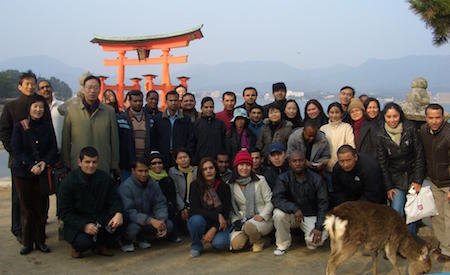
Fieldtrip with GRIPS classmates and professors at Miyajima, 2007
Oh! I miss everything about GRIPS and Tokyo, my friends Hassanjon the magnificent, Elizabeth my darling friend who has been my spiritual guide. Sudhir the most generous and loving guy I have met on earth and Chic who taught me how to dance and be myself. I miss the morning walks at Odaiba. I miss the train and chatting with my friends, especially me, Elizabeth and Sudhir coming from different parts of the world, following varied religions, cooked, lived and ate our meals together. We often laughed and cried as one. Cosmic Unity was what I learned in Japan.
If you could give one piece of advice to anyone considering studying at GRIPS what would it be?
Make the best of your time there. Study, learn, make friends, explore places and become who you really are!
How would you like to maintain involved with the School? What do you expect from GRIPS as an alumnus and do you have any suggestions on how to further utilize the GRIPS alumni network?
I would like to be invited sometimes for a lecture presentation or a reunion to recollect my memories at GRIPS. I think once in a while Alumni from a year can be gathered, sponsored by JICA, to reconnect to GRIPS and new entrants.





